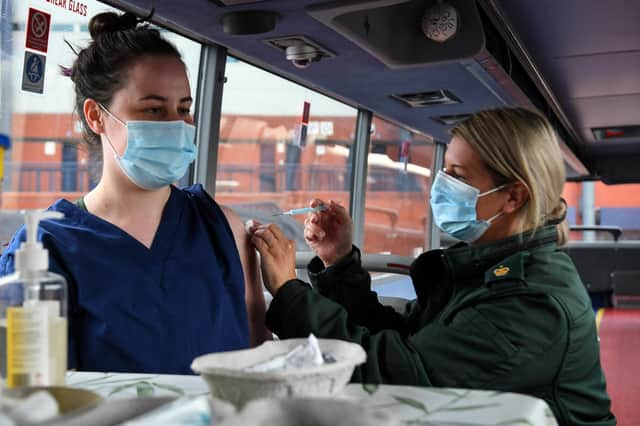Covid Scotland: Up to three quarters of people unvaccinated in some neighbourhoods, figures suggest


The data, published by the Scottish Parliament Information Centre (SPICe), is described as “useful” but coming with “some health warnings”, as the figures may be influenced by high student populations changing their home and term time addresses.
The report will be discussed by the Covid-19 recovery committee on Thursday. It shows vaccine uptake for neighbourhood, or “intermediate zone”, which has not previously been available from Public Health Scotland.
Advertisement
Hide AdAdvertisement
Hide AdThe lack of precision in the data highlights the lack of information around vaccine uptake in Scotland, the report concludes.
It shows that at of October 3, some areas of Glasgow and Edinburgh had a two-dose Covid vaccine take-up rate of less than 30 per cent.
Glasgow City Centre East had an uptake of 26 per cent, while Finnieston and Kelvinhaugh was at 27 per cent.
Meanwhile the figure was 29 per cent in Edinburgh’s Canongate, Southside and Dumbiedykes, and 30 per cent in the Old Town, Princes Street and Leith Street.
In both areas of Glasgow, it is estimated that around 14 per cent of the population are students, while in the Edinburgh areas this is nine per cent.
The majority of the neighbourhoods where uptake was recorded as below 50 per cent are in Edinburgh and Glasgow, alongside some in Fife, Dundee, and Aberdeen.
More recently, the report shows that as of October 25, Glasgow was the area with the lowest two dose uptake, at 79 per cent.
This was 80 per cent in Aberdeen and Dundee, and 81 per cent in Edinburgh.
Uptake was highest in East Dunbartonshire, at 96 per cent.
Advertisement
Hide AdAdvertisement
Hide AdLothian and Glasgow health boards both said they are working hard to get vaccine uptake as high as possible.
“It is vital that those who are eligible receive both doses of the vaccine,” said Pat Wynne, Nurse Director of Primary and Community Care at NHS Lothian.
“Across Lothian we continue to hold a range of clinics where people can pop-in if they need either their first dose or are now due their second dose of the vaccine.”
A spokesperson for NHS Greater Glasgow and Clyde said: “As the largest health board in Scotland, we have the largest population to vaccinate.
"We have found in some areas of Glasgow uptake hasn’t been as high and we are working with community leaders and local groups to understand the barriers people face. Our partners, Scottish Ambulance Service, have been supporting us with a mobile vaccination unit and we have deploying this in these areas.”
Mr Wynne underlined the caveats associated with the data.
“While this data is helpful, it is worth remembering that is unpublished, management information, which comes with significant caveats,” he said.
"For example, some people will have moved since they had their vaccination and not everyone in a local community will be registered with their local GP.
"These figures, therefore, may well be at their most unreliable in communities where a large number of the population has moved in or out over the course of the year. One of the most obvious examples of this are communities with large student populations.”
A message from the Editor:
Thank you for reading this article. We're more reliant on your support than ever as the shift in consumer habits brought about by coronavirus impacts our advertisers.
If you haven't already, please consider supporting our trusted, fact-checked journalism by taking out a digital subscription.
Comments
Want to join the conversation? Please or to comment on this article.
